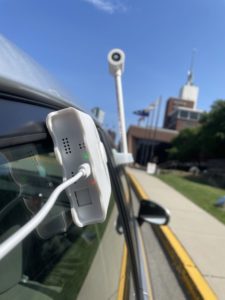Who is a member?
Our members are the local governments of Massachusetts and their elected and appointed leadership.

Eighty volunteers mounted specialized temperature and air quality sensors on their car windows or bicycles to measure ground-level air temperature, humidity and air particulate matter. (Photo courtesy David Sittenfeld)
The city of Everett has secured a $340,000 Municipal Vulnerability Preparedness grant, on behalf of a regional effort that includes Chelsea, Malden and Arlington, to build upon work recently completed by the Wicked Hot Mystic project.
“These grants will support and inform our efforts to keep residents and businesses cooler and protected from flooding as we undergo generational transformation,” said Mayor Carlo DeMaria in a statement.
Wicked Hot Mystic, a partnership including the Mystic River Watershed Association, the Museum of Science, the Resilient Mystic River Collaborative and the Metropolitan Area Planning Council, received a $186,200 MVP grant through the town of Arlington in 2020 to develop a heat map for the 21 municipalities in the 76-square-mile Mystic Watershed that would illustrate “real feel” temperatures and humidity to help inform projects and decisions related to heat resilience and air quality.
A group of 80 volunteers trained by the Museum of Science collected data over a two-day period in August 2021 by using sensors to measure ground-level air temperature, humidity and air particulate matter at designated times. The results of the study were released in July.
The study found that the hottest neighborhoods were in Chelsea, Somerville, East Boston, Everett, Revere and Charlestown, and there was a 10 degree Fahrenheit difference between these communities and the cooler neighborhoods during the mid-afternoon data collection time. The temperature maps, case study and full data set are available online.
According to the study, some neighborhoods and entire municipalities in the Greater Boston area experience hotter temperatures because of the urban heat island effect, where there are denser concentrations of pavement and buildings that absorb and retain heat. Because of historically discriminatory practices like redlining, the communities with the most intense heat tend to be low-income communities of color.
The results of Wicked Hot Mystic revealed discrepancies between neighborhoods that are primarily white and neighborhoods that are primarily people of color in both available tree cover — 43% versus 3% — and temperatures — a difference of 4 degrees Fahrenheit.
“Moving now into Wicked Cool Mystic, the vision and goal is to see no coalition between race, class, income and heat,” said Marissa Zampino, Community Organizer at Mystic River Watershed Association.
Wicked Cool Mystic will look at community-based solutions to urban heat islands identified in the most affected communities in the watershed. A primary partner in each community will be identified to help lead the process, with Arlington serving as an example of what a more resourced community can do. The team plans to engage in significant community work through 2023 to identify which solutions would be the best fit, Zampino said, and hopes to be piloting two potential interventions in Everett and Chelsea by 2024.
“You really want to be as deeply engaged in the community as possible when addressing heat islands,” Zampino said. “Consider presenting resources in multiple languages to get the largest amount of participation, and do strong community engagement. … When you do that you get a lot of community ownership about solutions for what is happening.”